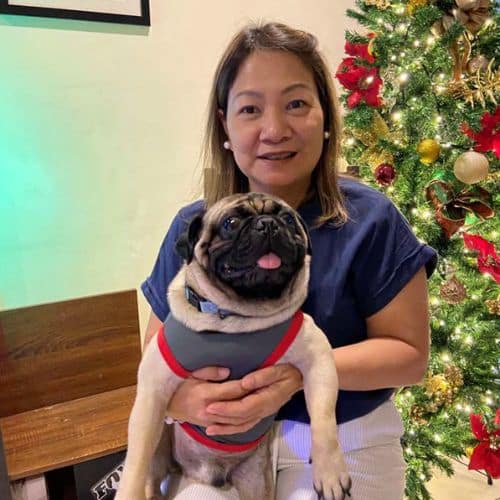Contents
Hello! Who are you?
Hi! My name is Karina and I’m from the Philippines in Southeast Asia. I’m 59 and have been a widow for almost three years. I live with my two grown children (they’re both single still!) and two lovely fur babies–a spunky Russell terrier named Gigi and an adorable pug named Mosey.
I’m a writer by profession. I’ve been doing freelance writing for clients from various industries after leaving my office job in 2009. Currently, I’m a Content Administrator for RentPost, a property management software company based in Tampa, Florida.
I work from home (yes, everything I do is on a remote work arrangement long before it became the “in-thing” during the Coronavirus pandemic). Best decision I ever made since it allows me to travel whenever I want to, go on weekly lunches with my besties, and do training sessions or take long walks with my dogs (who have become my life these days!).
I have a passion for the outdoors and used to trek a lot pre-pandemic. These days, I go on regular early morning walks with my Jack Russell to get those happy hormones working. This particular dog breed needs lots of exercise so it’s a win-win situation for both of us. Mosey, my Pug, is a couch potato and gets my undivided attention during Netflix sessions in the evening. Dogs really work magic when it comes to dealing with loneliness and depression. No wonder they own the top spot for animal assisted therapy!
Yes, I am definitely happy. But it almost took me a lifetime to realize that. It must have been because of my unique life circumstances. I lost my Mom and two sisters in a sea tragedy over forty years ago. I was only 15 then. and growing up without a mom during your teenage years was plain difficult.
Although I come from a large family of seven siblings, there was no one around to walk me through the awkward phase of adolescence or offer some relationship advice (which, looking back, is really crucial!).
At 25, I got married to a loving husband and father to my two kids. However, he did have a major struggle with substance abuse. And I was the co-dependent who saw him through it all.
Late night outs or even a few days of not coming home was the norm for my husband. We also had our share of vehicular accidents and occasional brushes with the law. It came to a point when our motor insurer was already thinking twice about renewing our annual policy. They were losing money on our claims. 😛
The clincher was a criminal case filed against my husband for possession of illegal substances. Good thing the offense was bailable. But never in my wildest dreams did I ever think of being in a courtroom, not with the plaintiff, but with the accused. You see, I come from a mildly influential family in our city, my dad having served as its congressman and mayor in the past.
The court hearings stretched through the years due to the pandemic and it was slowly eating up the both of us. Then, in December 2020, just a few months before judgment could be passed, my husband died in his sleep. It was a painless death that I, and the rest of the family, saw as divine intervention.
My husband had always said that he would rather take his own life than spend the rest of it in jail if he was found guilty. On the other hand, there was this huge possibility that he would go back to his vices if he got acquitted. So God decided to step in and save him from all that.
From my end, that was a huge revelation regarding the principle of fate, destiny, or karma. How we exit from this earthly existence isn’t really determined by how we live–it is wholly dependent on God’s mercies.
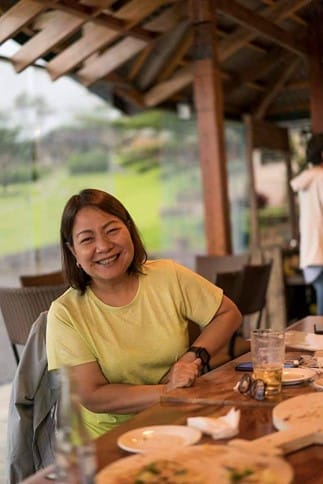
💡 By the way: Do you find it hard to be happy and in control of your life? It may not be your fault. To help you feel better, we’ve condensed the information of 100’s of articles into a 10-step mental health cheat sheet to help you be more in control. 👇
What is your struggle and when did it start?
I was diagnosed with generalized anxiety disorder (GAD) when I sought professional help in 2021. I was struggling with anxiety and depression after my husband and brother passed away eight months apart the year before.
I couldn’t perform simple tasks like cleaning the bathroom or planning the weekly menu. Thinking of what to cook for the next meal was overwhelming. Little things like the water pump conking out, the dogs missing a feeding, or my household helper going on her weekend off seemed like the end of the world. I had to stop driving because I would have a panic attack at the most unexpected moments.
Funny, but those who knew what I went through during married life were saying I should be relieved now that all the stress was over. True, but my body must have been so accustomed to stress that my system went haywire with the abrupt change. I thrived on stress and was so used to finding solutions to problems and issues that the lack of it was sort of boring.
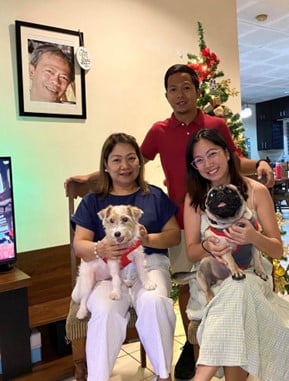
How did this struggle make you feel at your worst moments?
While the physical symptoms were typical–nausea, breathlessness, and elevated heart rate–depression numbed me on the inside. I was constantly staring into space, forcing myself to laugh at supposedly funny moments but finding it extremely difficult to cry. Looking back, I never shed a tear during my 36-month battle with depression.
My struggle with anxiety and depression also took its toll on my writing. I experienced brain fog and writer’s block, and what normally took me a couple of hours to write took several days to complete.
I also lost a lot of weight–which was very welcome at the start since I’m on the curvy end. But I did panic when my weight fell below 120 lbs (from a normal of 135-140 lbs.) I was only eating about 2-3 spoonfuls per meal.
My sister and a few close friends knew what I was going through and they were a BIG help. They were very supportive and communicated with each other, making sure someone took me out to an occasional lunch or out-of-town trip just to ‘get away from it all”.
I also informed both of my children about what I was going through so they would understand my actions. I was so blessed they offered to fill in for what I couldn’t get done.
Throughout this time, I continued going out with friends. I would even drop work in the middle of the week to go for a short overnight out-of-town trip. But coming home even made things worse.
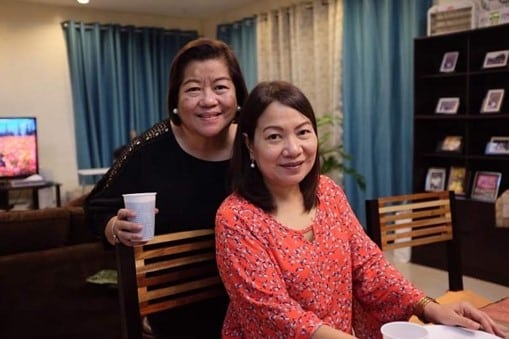
👉 Share your story: Help thousands of people around the world by sharing your own story. We would love to publish your interview and have a positive impact on the world together. Learn more here.
Was there a moment when you started to turn things around?
Things started to turn around when I saw a psychiatrist. She was simply brilliant. I’ve been to other shrinks in the past but they were kind of patronizing, which doesn’t work for bullheaded individuals like me. But this one quickly zeroed in on the real issue I was facing, which was probably the cause of my depression.
My shrink told me I was at a point in life when ideally, I could have comfortably saved up for retirement (which I have not) and had the fear of facing the future alone. After a short assessment, she gave me the GAD diagnosis and recommended I go on medication.
One thing I learned about seeing a shrink–they’re simply there to walk you through your struggles; everything else depends on YOU. Even the decision to opt for simple counseling or go on medication.
I opted for the latter and first went on sertraline (brand name Zoloft, which I struggled with), then with escitalopram (Lexapro), which worked wonders for me. I took it for a year, resumed writing and traveling during that period, and then weaned off, thinking I was feeling okay.
I was good for a couple of months until the anxiety started creeping in again for no reason. I resumed medication for another four months and am now off it for the past six months.
Anxiety and depression can be cyclical, I was told. One just needs to be aware of their unique triggers. For instance, some may start feeling lonely after the holidays or following a momentous event. Others may be triggered by memories associated with certain places, people, or even things.
I must say things will turn around when you choose to, so I think it was 100% the result of my own actions in my case. We cannot control life circumstances, but we can control our actions.
It was I who decided to see a shrink. It was I who decided to go on medication. There were no notable circumstances that affected my struggle to overcome depression–everything was normal and typical.
What steps did you take to overcome your struggle?
For starters, I think the first and only essential step you need to take is to accept that you need help. What really helped me was having family and friends around (but be sure not to wear them out to the point that you become a burden).
To a depressed person, everything is impossible. Even making that initial appointment with a shrink seems impossible. The depressed person will continually procrastinate and put things off.
In my case, my sister set up the appointment for me and even offered to drive me to the clinic. She also had her assistant purchase my initial round of medication.
I have this small group of childhood friends I regularly hang out with and they were a big help as well. Even though it was difficult, I forced myself to socialize with them so I could leave the confines of home. There’s a bigger world out there and anyone suffering from depression has to know that.
I also carefully chose the people I shared my struggles with. I found comfort in those who simply listened and did nothing much except to be with me at that moment. My advice to anyone living or associating with someone who is depressed: Listen well and listen with compassion.
Never say they’re facing such a small issue. Never cut a conversation short to offer a piece of advice or give an example of your own struggles that could have been worse. It sucks!
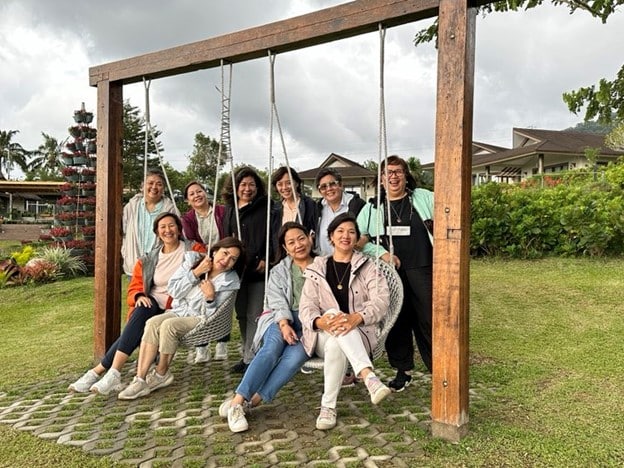
Have you shared any of this with people around you in real life?
As mentioned earlier, my sister was instrumental in my recovery. My “girl gang” also did their share by taking me out to lunches, bringing me along on their travels, or simply sending my favorite food on no occasion.
I felt most comfortable sharing my struggles with friends who’ve been through tough times themselves. Scarred people make the most compassionate friends.
In contrast, I was most uncomfortable talking about my struggles with arrogant or condescending personalities who make you think their horror stories are worse than yours. Or their successes better than yours. So be very careful in choosing the people to whom you bare your heart and soul, warts and all.
If you could give a single piece of advice to someone else that struggles, what would that be?
The moment loneliness or despair sets in, see the glass as half full rather than half empty. We are blessed beyond what we think.
It’s all a matter of perspective. The grass isn’t always greener on the other side of the fence. Tend your own garden, no matter how small it may be. That way, you can bloom where you are planted and send out the flowers when all is well.
There’s really nothing I wished I knew earlier – every circumstance and event in my life happened for a reason and a purpose. I believe I wouldn’t be the best version of myself if things happened in a different way.
What have been the most influential books, podcasts, YouTube channels, or other resources for you?
I’ve read these books at different stages of my life and continue to re-read them whenever I need some inspiration.
- The Purpose Driven Life by Rick Warren has helped me zero in on why am I here on earth and how I can find meaning in all that life has to offer.
- Simple Abundance: 365 Days to a Balanced and Joyful Life is every woman’s bible which helps you develop a keen perception of the little blessings in your daily life.
- The Art of War by Sun Tzu is my all-time favorite book on survival and how to address conflicts and struggles.
- Good Morning God by Pamela Steinke is a must-read for anyone suffering from anxiety or depression.
Where can we go to learn more about you?
You can learn more about me on LinkedIn.
Is there anything else you think we should have asked you?
I’d just like to emphasize this more:
Depression isn’t a weakness of character; rather it stems from a chemical imbalance in the brain resulting from sustained stress or sudden emotional losses. It can even be genetic.
Depression is a complex and serious condition so never be afraid to seek help from a therapist, psychiatrist, or counselor. And if you can’t get yourself to set an appointment, reach out to someone who can do it for you.
💡 By the way: If you want to start feeling better and more productive, I’ve condensed the information of 100’s of our articles into a 10-step mental health cheat sheet here. 👇
This Cheat Sheet Will Help You Be Happier and More Productive
Thrive under stress and crush your goals with these 10 unique tips for your mental health.
Want more interviews?
Continue reading our inspiring case studies and learn how to overcome mental health struggles in a positive way!
Want to help others with your story? We would love to publish your interview and have a positive impact on the world together. Learn more here.

